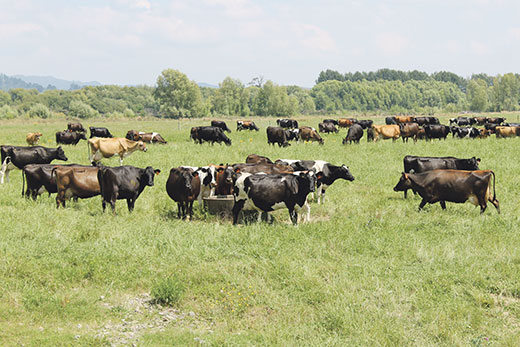Dairy farmers could be in for a tough couple of years as global markets remain volatile, warns Derek Spratt of the Bay of Plenty Rural Support Trust.
'So far we haven't heard of any major issues for farmers, but now the low milk prices are going to start hurting,” says Derek.
The grass may be growing but farmer incomes aren't as lush right now.
'The message from Rural Support to farmers everywhere, is don't bottle up your problems, seek help and if you're okay but you think your neighbour might not be, pay them a visit.”
Derek says the unique circumstances of rural life, and in particular the uncertainty around milk payouts, can only be truly understood by rural people who share the same challenges, so farmers are often the best people to talk to.
'However, sometimes it's best to talk about anything but farming, just to give yourself a chance to clear your head.”
Derek, who has weathered many climatic and financial storms in his decades of farming, says it's also vital to talk to accountants and banks about the issues that may be facing a farming business.
'Banks are pretty good, they take a long-term view but you have to keep them in the picture. Not telling them what is going on is not wise.
'It's good to hear most farmers seem to be keeping their banks and accountants well informed.”
Provisional tax
With provisional tax payments looming, Derek suggests reviewing finances with accountants as it may not be necessary for some farmers to make the May payment.
Financial and global market volatility is expected by farmers, but they once went in yearly cycles. Derek says now the volatility is almost month to month, which makes planning very hard.
He wouldn't be surprised if dairy companies make a further drop in payout predictions before their financial year ends.
New Zealand farmers are affected by events across the other side of the world, including the conflict in Ukraine which has led Russia to embargo dairy imports from Europe and the removal of EU milk quotas some predict will see the markets saturated with milk, forcing a further drop in price.
'It's hard to gauge the effect of the removal of quotas. It could ultimately result in the drop in production as it becomes uneconomic to continue with ‘cut and carry' farming where feed is cut and taken to the cows.”
World conflicts
That could ultimately benefit New Zealand farmers but the impacts could take time to be felt.
Fonterra CEO Theo Spierings is also concerned about international conflicts and political unrest, saying geo-political situations in Russia, the Middle East and West Africa are all having an impact on international milk prices.
'The geo-political situation in many ways is worse than at the end of World War II in terms of refugee numbers. All this has an impact on demand.”
Theo believes the uncertainties caused by conflicts and political tensions are unlikely to be resolved 'any time soon”.
Fonterra chairman John Wilson says at current global milk prices dairy farming in not sustainable for farmers anywhere in the world.
However, he expects falling prices to result in decreased production but he too believes the markets will remain volatile.
'Volatility used to be a five to seven-year cycle but it's a lot shorter cycle now.”
DairyNZ chief executive Tim Mackle says the challenge for farmers will be working through their cash flow position for the coming season.
Tight times
'What we are concerned about is that the low milk price this season coupled with a low retrospective payment this winter – about one-third of what was received last year – will see many farmers dip into the red this spring.”
For many, they may not pop back up into the black for some time, says Tim. 'Banks are telling us that many farmers will hit $1.50-$2 kilograms of milksolids in overdraft this September.
'Knowing those winter payments will drop in this next season will be second nature to many farmers.
'But the ones who have already forecasted their cash flows are surprised at how long they stay low. They are now taking steps to put strategies in place to manage those impacts. That's a bit of a wake-up call for everyone,” says Tim.
DairyNZ's Tactics for Tight Times events are being held around the country. For details, see www.dairynz.co.nz



0 comments
Leave a Comment
You must be logged in to make a comment.